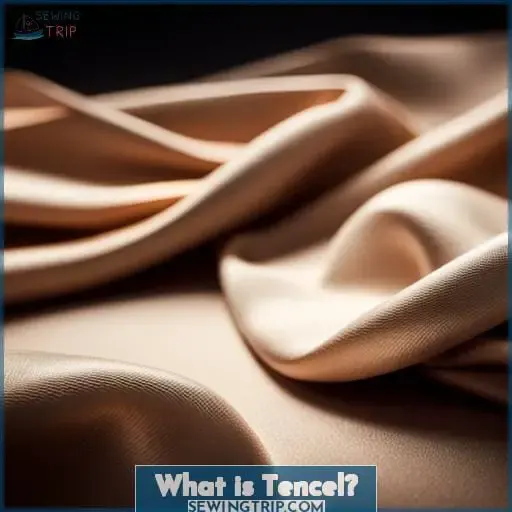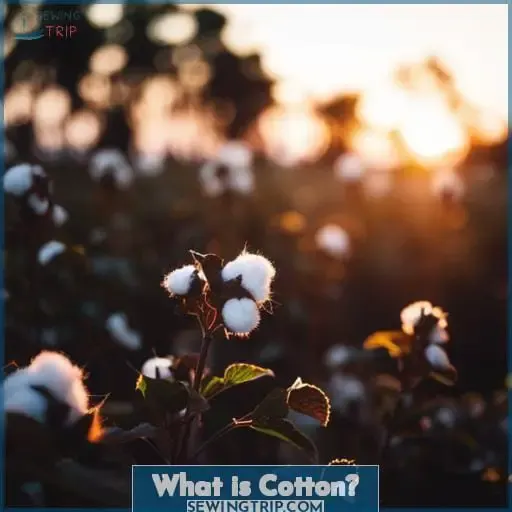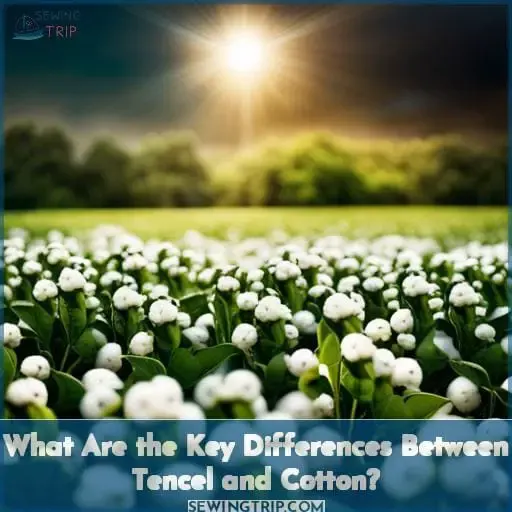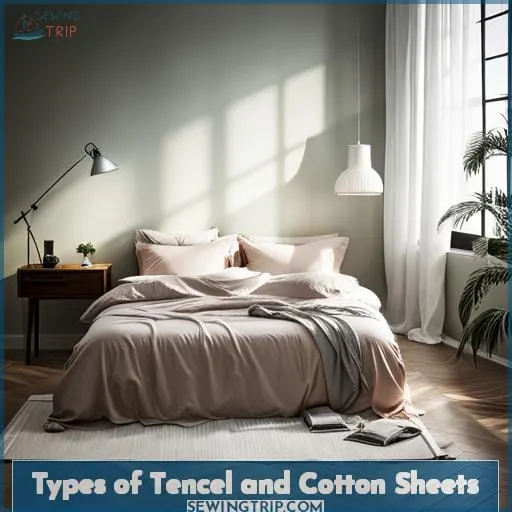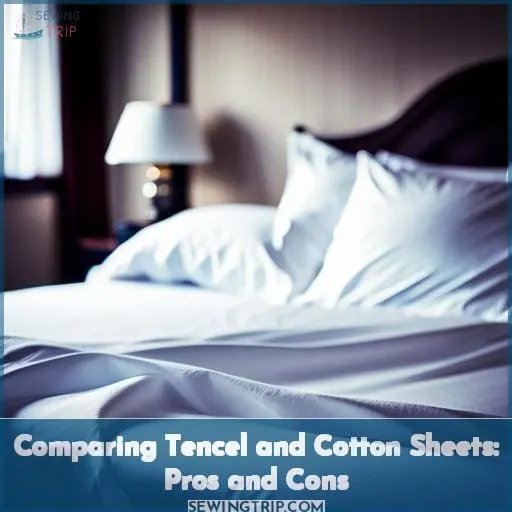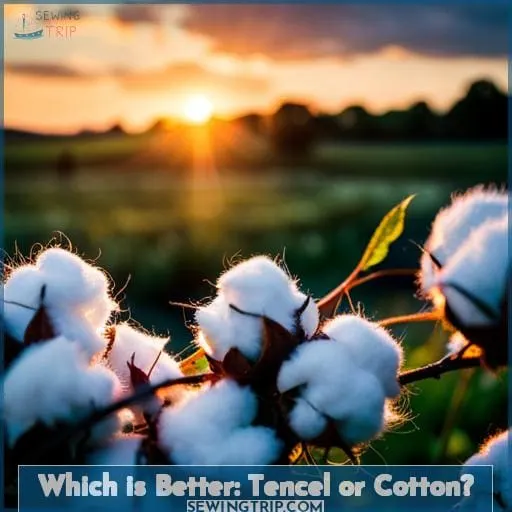This site is supported by our readers. We may earn a commission, at no cost to you, if you purchase through links.
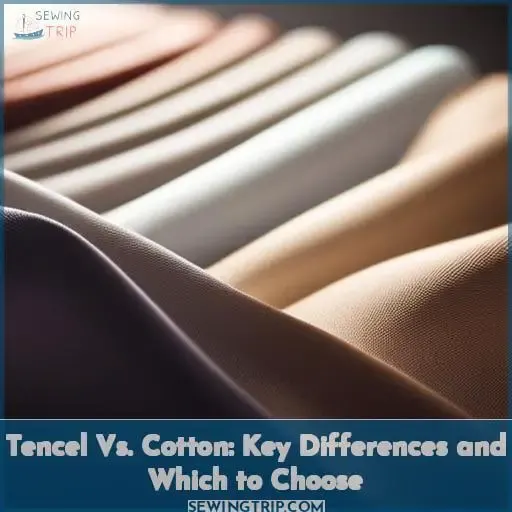 Are you curious about the difference between Tencel vs. cotton sheets? With so many options on the market, it’s hard to know which fabric is best for your sleeping needs. Fortunately, a deep dive into these two materials can help you make an informed decision that’s right for you and your budget.
Are you curious about the difference between Tencel vs. cotton sheets? With so many options on the market, it’s hard to know which fabric is best for your sleeping needs. Fortunately, a deep dive into these two materials can help you make an informed decision that’s right for you and your budget.
When comparing Tencel vs cotton sheets, there are several key differences in price point, production process, and overall feel—all of which have implications when choosing bedding materials suited to your sleep style.
Table Of Contents
Key Takeaways
- Tencel is derived from eucalyptus wood pulp while cotton is made from cotton plant fibers.
- Tencel is known for its softness and moisture-wicking properties, while cotton is absorbent and suitable for humid climates.
- Tencel surpasses cotton in moisture-wicking capabilities, making Tencel sheets a better choice for those who sweat during sleep.
- Although more expensive than cotton, Tencel sheets are more eco-friendly to produce.
What is Tencel?
If you’re curious about the mysterious material that’s been making waves in the bedding world, Tencel is like a secret ingredient that adds an extra touch of luxury and sustainability to your sheets. Tencel, also known as lyocell or rayon, is derived from eucalyptus wood pulp and has gained popularity for its exceptional softness and moisture-wicking properties.
Compared to cotton, Tencel offers several benefits such as being smoother on the skin and more environmentally friendly due to its sustainable production process. Cotton, on the other hand, comes in different weave types like percale or sateen which offer their own characteristics of breathability or lustrous appearance respectively.
Having this knowledge will help you make an informed decision based on your personal preferences regarding softness, maintenance, and environmental impacts without sacrificing comfort.
What is Cotton?
Consider the timeless and versatile fabric derived from the cotton plant, known for its softness, durability, and wide variety of options.
It is highly absorbent, allowing it to wick away moisture from your body as you sleep. This makes it ideal for those who tend to sweat during the night or live in humid climates. Additionally, cotton sheets are known for their durability and can withstand regular washing without losing their quality or shape.
Cotton comes in different weaves such as percale, sateen, twill, and flannel. Percale is lightweight and breathable, sateen is lustrous and wrinkle-resistant, twill is sturdy with potential softening over time, and flannel is thick and cozy.
For those seeking high-quality cotton sheets with superior softness, Pima cotton is an excellent option.
What Are the Key Differences Between Tencel and Cotton?
When it comes to sheet materials, cotton and Tencel have distinct characteristics that set them apart. The key differences between Tencel and cotton lie in their cost, comfort, varieties, and environmental impact.
While Tencel sheets are slightly more expensive due to the production process involved in creating fibers from wood pulp, they offer a softness that is unmatched by cotton. Additionally, Tencel’s moisture-wicking properties make it ideal for those who tend to sweat at night or have high body temperatures.
On the other hand, cotton offers a wide range of varieties such as regular cotton, Egyptian, Pima, and different weaves like percale, sateen, twill, and jersey.
Taking into consideration these factors, the choice between Tencel vs. cotton ultimately depends on personal preference and specific needs.
Is Tencel Better Than Cotton?
Consider your specific needs and preferences when deciding between Tencel and cotton sheets. If you’re a hot sleeper or value sustainability, Tencel may be the better choice for its cooling properties and eco-friendly production.
On the other hand, if you prioritize variety, warmth, and durability in your sheets, cotton is a versatile option that offers different types of fabric weaves to suit your preferences.
Who Should Choose Tencel?
Discover the ideal sheet material that caters to your specific needs and preferences. If you’re a hot sleeper, Tencel is the perfect choice for you. With its excellent moisture-wicking properties, Tencel keeps you cool throughout the night.
Not only does it regulate body temperature, but it’s also eco-friendly due to its sustainable production process using eucalyptus wood pulp. Unlike silk, Tencel offers similar softness and smoothness without compromising on durability or comfort.
To ensure the longevity of your Tencel sheets, proper care is essential in maintaining their quality and performance.
Who Should Choose Cotton?
If you’re looking for a versatile and durable option, cotton is the way to go, with its ability to last up to fifty years. Cotton sheets offer excellent warmth, making them ideal for cold sleepers or chilly nights.
Additionally, cotton provides a wide range of variety when it comes to weaves and types of cotton available. While pricing may vary depending on the type and quality of cotton chosen, it generally offers great value for money compared to Tencel sheets.
When considering durability and versatility in your sheet choice, cotton is a reliable option worth considering.
If you’re looking for a versatile and durable option that can stand the test of time without compromising on comfort or style, then look no further than good old-fashioned cotton sheets.
Cotton has long been hailed as one amongst nature’s most bountiful gifts: not only does this material possess inherent breathability properties which make sure we stay cool during those hot summer nights but also regulate temperature throughout year-round use; ensuring optimal sleeping conditions regardless outside weather conditions! In addition what sets apart from other fabrics such polyester (which trap heat) wool (which naturally insulates body) etc.
Another reason why should choose over alternatives lies sheer magnitude options offered marketplace today- truly endless possibilities await discerning consumer searching perfect bedding ensemble complement their personal taste personality type! Whether prefer crisp matte appearance percale weave silky smoothness sateen twill cozy comfort flannel – there truly something everyone here.
Ultimately, comes down personal preference when deciding between Tencel cotton sheets however it must be noted that cold sleepers those live colder climates may particularly appreciate added warmth provided by this beloved material.
Types of Tencel and Cotton Sheets
When it comes to choosing between Tencel and cotton sheets, understanding the different types available is crucial. Both materials offer a range of options that cater to various preferences and needs.
Let’s explore the four key factors in determining which type of sheet suits you best:
- Tencel blends: Some Tencel sheets are blended with other fibers like cotton or polyester to enhance their properties, such as durability or wrinkle resistance.
- Thread counts: Cotton sheets often boast high thread counts, indicating a higher number of threads per square inch.
- Environmental impact: If eco-friendliness is important to you, consider opting for Tencel lyocell or modal sheets made from sustainably sourced wood pulp using an environmentally friendly production process.
- Egyptian cotton vs Pima Cotton: Egyptian cotton has longer fibers than regular cotton while Pima (also known as Supima) boasts silky smoothness due to its long staple length.
By considering these factors when selecting your new bedding, you’ll be able to make an informed decision that aligns with your specific requirements.
Comparing Tencel and Cotton Sheets: Pros and Cons
Consider the pros and cons of each material as you compare sheets made from these two popular fabrics. When it comes to Tencel vs. cotton sheets, there are several factors to consider.
In terms of durability, cotton sheets have a longer lifespan compared to Tencel sheets, which may be more prone to wear and tear over time.
Temperature regulation is another important aspect, with Tencel being known for its moisture-wicking properties that help keep you cool throughout the night, while cotton provides cozy warmth in colder months.
The environmental impact is also worth noting, as Tencel is considered more eco-friendly due to its sustainable production process using renewable eucalyptus trees, whereas conventional cotton farming can have negative effects on water usage and pesticide use.
Additionally, if you have sensitive skin or allergies, Tencel’s smoother texture may be preferable over potentially irritating cotton fibers.
| Factors | TENCEL Sheets | COTTON Sheets |
|---|---|---|
| Durability | Prone to wear-and-tear | Long-lasting durability |
Temperature Regulation
Environmental Impact
Skin Sensitivity
-Smooth texture
-Irritating fibers
Price Comparison
-More expensive
-Affordable option
Which is Better: Tencel or Cotton?
When considering which material is better – Tencel or cotton – think about your preferences and specific needs.
Tencel offers several benefits such as being softer, smoother, and less irritating to sensitive skin compared to cotton. It also has a cooling effect thanks to its moisture-wicking properties, making it suitable for those with high body temperatures.
Additionally, Tencel is eco-friendly since it comes from renewable eucalyptus trees and requires less water during production.
On the other hand, cotton has its advantages including durability and value for money. Cotton sheets can improve with age and last up to fifty years if properly cared for. They also offer a variety of weaves like flannel or sateen that provide different levels of coziness or breathability depending on your preference.
When considering cost, Tencel sheets tend to be more expensive compared to cotton due to higher production costs associated with manufacturing. Fabric durability should also be taken into account when choosing between Tencel and cotton sheets.
In conclusion, the decision between Tencel and cotton ultimately depends on personal preferences and specific needs. Consider factors such as the feel of each fabric, and take into account environmental impact, cost, and desired fabric durability.
Conclusion
Tencel and cotton have differences worth considering when choosing sheets. Tencel comes from a renewable resource – eucalyptus pulp. Cotton’s a classic known for durability. With care, cotton sheets last up to fifty years, while Tencel sets may need replacement more often.
Tencel’s notably soft and breathable. Cotton provides more warmth and variety. The best material depends on individual needs. Tencel may suit those with sensitive skin, heat issues, or hygiene concerns. Cotton’s a reliable, versatile choice.

